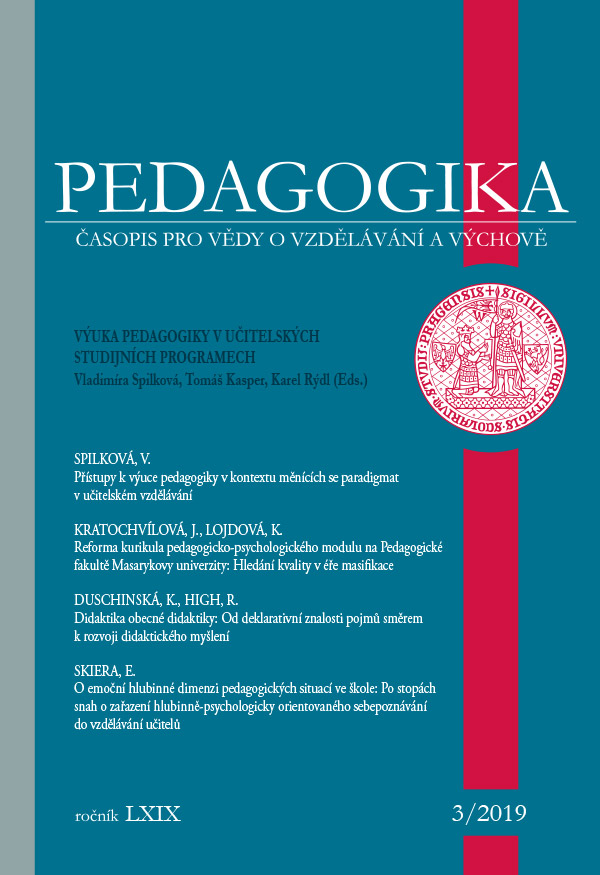Didactics of General Didactics: From declarative knowledge towards the development of didactic thinking
DOI:
https://doi.org/10.14712/23362189.2019.1516Keywords:
general didactics, the didactics of general didactics, the study of teaching, the development of didactic thought.Abstract
General didactics has a key position in the study plans of master’s degrees in the fields of teaching of general educational subjects, and it is general didactics that we expect to lay the theoretical foundations of the teaching profession. This study has three main goals: to reflect on the educational needs of future teachers, to present a thematic analysis of the most frequently used university textbooks of general didactics, and to analyse the process of innovation of the teaching of general didactics in the light of demands for quality in university teaching. The eight-year process of innovation is illustrated by the interim results of student evaluations of teaching, and the basic aspects of the teaching of the subject of general didactics are analysed: the goals of the subject, content, examination, activity in teaching and apart from teaching and use of examples from practice. The aim of these innovations has been to arrive by progressive steps at a balanced model of the teaching of general didactics, based on the integration of the theory of teaching and the results of empirical educational research with an understanding of concrete didactic situations. The main result of this study is six requirements on the teaching of general didactics in degree courses in teaching.
Keywords: general didactics, the didactics of general didactics, the study of teaching, the development of didactic thought.
References
Ambrose, S. A. (2010). How learning works: Seven research-based principles for smart teaching. San Francisco, CA: Jossey-Bass.
Biggs, J., & Tang, C. (2011). Teaching for quality learning at university: What the student does (4. vyd.). Maidenhead & New York: Society for Research into Higher Education & Open University Press.
Čapek, R. (2015). Moderní didaktika: lexikon výukových a hodnoticích metod. Praha: Grada.
Estes, T. H., Mintz, S. L., & Gunter, M. A. (2010). Instruction: A models approach (6. vyd.). Boston: Pearson.
Hattie, J. (2009). Visible learning: A synthesis of over 800 meta-analyses relating to achievement. New York: Routledge.
https://doi.org/10.4324/9780203887332
Hattie, J. (2012). Visible learning for teachers: Maximizing impact on learning. London: Routledge.
https://doi.org/10.4324/9780203181522
Hrabal, V., Man, F., & Pavelková, I. (1989). Psychologické otázky motivace ve škole (2. upravené vyd.). Praha: SPN.
Chamoniklasová, J. (2005). Věcný text v české a anglosaské kultuře. In Z. Fišer (Ed.), Tvůrčí psaní - klíčová kompetence na vysoké škole. Sborník příspěvků z mezinárodní konference. Brno: Doplněk.
Janík, T. (2003). Didaktika obecná a oborová: pokus o systemizaci pojmů. Brno: Masarakova univerzita, Pedagogická fakulta.
Janík, T. (2009). Obecná didaktika. In J. Průcha (Ed.), Pedagogická encyklopedie (s. 649-652). Praha: Portál.
Kalhous, Z., Obst, O., et al. (2009). Školní didaktika (2. vyd.). Praha: Portál.
Maňák, J. (2003). Nárys didaktiky. Brno: Masarykova univerzita, Pedagogická fakulta.
Mareš, J. (2009). Edukace založená na důkazech: inspirace pro pedagogický výzkum i školní praxi. Pedagogika, 59(3), 232-258.
Marzano, R. J., Pickering, D., & Pollock, J. E. (2001). Classroom instruction that works: Research-based strategies for increasing student achievement. Alexandria, VA: Association for Supervision and Curriculum Development.
Pasch, M. (2005). Od vzdělávacího programu k vyučovací hodině (2. vyd.). Praha: Portál.
Petty, G. (2013). Moderní vyučování (6., rozš. a přeprac. vyd.). Praha: Portál.
Petty, G. (2014). Evidence-based teaching: A practical approach (2. vyd.). Oxford: Oxford University Press.
Průcha, J. (2018). Oblasti edukační reality opomíjené českým pedagogickým výzkumem (Online). Dostupné z www.capv2018.utb.cz
Ramsden, P. (2003). Learning to teach in higher education (2. vyd.). New York: Routledge Falmer.
https://doi.org/10.4324/9780203507711
Schunk, D. H. (2012). Learning theories: An educational perspective (6. vyd.). Boston: Pearson.
Silver, H. F., Strong, R. W., & Perini, M. J. (2007). The strategic teacher: Selecting the right research-based strategy for every lesson. Alexandria, VA: Association for Supervision and Curriculum Development.
Skalková, J. (1996). Aktuální aspekty rozvíjení didaktického myšlení. Pedagogika, 46(3), 209-213.
Skalková, J. (2007). Obecná didaktika: vyučovací proces, učivo a jeho výběr, metody, organizační formy vyučování. Praha: Grada.
Slavin, R. E. (2012). Educational psychology theory and practice (10. vyd.). New Jersey: Pearson.
Slavík, J. (1999). Hodnocení v současné škole: východiska a nové metody pro praxi. Praha: Portál.
Slavík, J. (2009). O teorii pro posthospitační rozbor aneb Reflexe příběhu výuky jako prostředek rozvoje didaktických znalostí obsahu. In T. Janík et al., Možnosti rozvíjení didaktických znalostí obsahu u budoucích učitelů (s. 33-44). Brno: Paido.
Slavík, J., Janík, T., Najvar, P., & Knecht, P. (2017). Transdisciplinární didaktika: o učitelském sdílení znalostí a zvyšování kvality výuky napříč obory. Brno: Masarykova univerzita, Pedagogická fakulta.
Starý, K. (2006). Efektivní výukové strategie. (Disertační práce). Praha: Univerzita Karlova, Pedagogická fakulta.
Swennen, A., Lunenberg, M., & Korthagen, F. (2008). Preach what you teach! Teacher educators and congruent teaching. (Online). Teachers & Teaching, 14(5-6), 531-542.
https://doi.org/10.1080/13540600802571387
Škoda, J., & Doulík, P. (2011). Psychodidaktika: metody efektivního a smysluplného učení a vyučování. Praha: Grada.
Štech, S. (2018). Slavík, J., Knecht, P., Najvar, P., & Janík, T. (2017). Transdisciplinární didaktika: o učitelském sdílení znalostí a zvyšování kvality výuky napříč obory. (Recenze). Pedagogika, 68(4), 413-418.
Šturma, J. (1993). Didaktické myšlení jako učitelská způsobilost. Pedagogická orientace, 7(3), 57-59.
Tomková, A. (2015). Princip izomorfismu v učitelské přípravě. Pedagogika, 65(1), 75-81.
Vašutová, J. (2002). Strategie výuky ve vysokoškolském vzdělávání. Praha: Univerzita Karlova, Pedagogická fakulta.
Zormanová, L. (2014). Obecná didaktika: pro studium a praxi. Praha: Grada.



